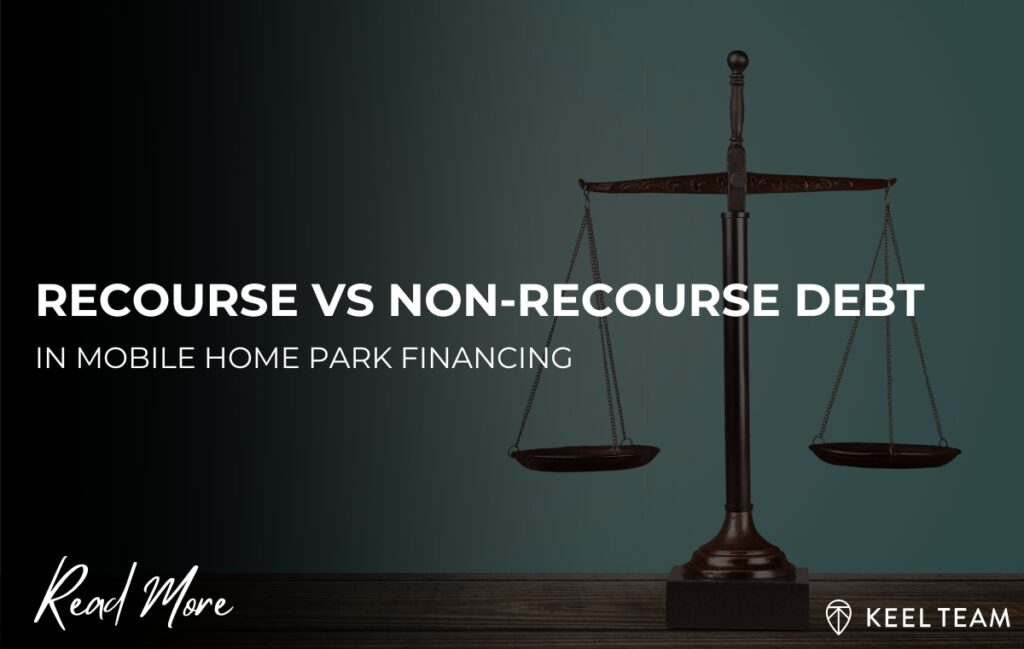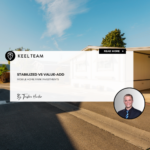Recourse vs. Non-Recourse Debt in Mobile Home Park Financing
-
 Tristan Hunter - Investor Relations
Tristan Hunter - Investor Relations

When it comes to mobile home park financing, understanding the distinction between recourse and non-recourse debt can prove crucial. This knowledge typically helps investors make informed decisions and manage their risk effectively. Let’s dive into what these terms mean and why non-recourse debt is prevalent in the mobile home park asset class.
What is Non-Recourse Debt?
Non-recourse debt is a type of loan where the lender’s recovery is limited to the collateral. In the event of a default, the lender can seize the property used as collateral but cannot pursue the borrower for any further compensation, even if the sale of the property does not cover the entire loan balance. This type of debt contrasts with recourse debt, where the lender can seek additional assets or income from the borrower to cover the shortfall.
Example: If you default on a non-recourse loan and the property sells for less than the loan amount, the lender cannot go after your personal assets for the difference. They must absorb the loss.
Pros of Non-Recourse Debt:
- Risk Mitigation: Limits the borrower’s liability to the collateral.
- Asset Protection: Personal assets remain safe from lender claims.
- Encourages Investment: Investors may feel more secure taking on projects knowing their personal risk is capped.
Cons of Non-Recourse Debt:
- Higher Down Payment: Often requires a larger down payment.
- Stricter Terms: Lenders may impose stricter terms and conditions.
- Limited Availability: Not as widely available as recourse loans.
Learn more about mobile home park financing and the benefits of securing non-recourse loans! Download our FREE eBook, “Top 20 Things I’ve Learned from investing in Mobile Home Parks“
By Andrew Keel
Recourse Debt Explained
Recourse debt, on the other hand, allows the lender to pursue the borrower’s other assets beyond the collateral if a default occurs. This means the borrower is personally liable for the entire loan amount, not just the value of the collateral.
Example: If you default on a recourse loan, the lender can sell the collateral and, if the sale proceeds fall short of the loan balance, they can also claim your personal assets to make up the difference.
Pros of Recourse Debt:
- Lower Down Payments: Often requires a smaller down payment.
- Easier Approval: Lenders may be more willing to approve loans with recourse terms.
- Potentially Better Terms: May come with lower interest rates due to reduced lender risk.
Cons of Recourse Debt:
- Personal Liability: The borrower’s personal assets are at risk.
- Higher Risk: Increased financial exposure for the borrower.
- Deters Investors: Some investors may avoid these loans due to the higher personal risk.

Why Non-Recourse Debt is Common in Mobile Home Park Financing
Mobile home parks offer several non-recourse financing options, making them attractive to investors. Here’s why:
- Seller Financing: Historically, seller financing has been a solid method for financing mobile home parks. In this setup, the seller acts as the lender, providing a loan secured by the property itself. The buyer benefits from non-recourse terms, meaning their liability is limited to the property. If the buyer defaults, they lose their down payment and the property, but typically nothing more.
- Bank Financing: While traditional bank loans often require recourse, some banks offer non-recourse options if the borrower makes a larger down payment. For instance, a bank might require recourse with a 20% down payment but switch to non-recourse if the down payment is 40% or more. This flexibility can be advantageous for buyers who want to limit their personal liability.
- CMBS “Conduit” Financing: Commercial Mortgage-Backed Securities (CMBS) loans are non-recourse and based on the securitization of loan pools. In this model, the lender acts as a servicer, and the loan is sold to investors. CMBS loans are typically available for loan amounts of $1 million and up, making them a significant option for larger mobile home park investments.
- Fannie Mae/Freddie Mac “Agency” Financing: Fannie Mae and Freddie Mac are major players in the mobile home park financing market, accounting for over 50% of the total loan volume annually. Their loans are non-recourse except for instances of fraud. These government-sponsored enterprises offer favorable terms and competitive rates, making them a popular choice for investors.
Conclusion
Understanding the difference between recourse and non-recourse debt is vital for mobile home park investors. Non-recourse options, such as seller financing, certain bank loans, CMBS loans, and Fannie Mae/Freddie Mac financing, offer substantial benefits. These options limit personal liability, protect assets, and provide security, making mobile home park investments more attractive and manageable.
By choosing the right financing structure, investors can mitigate risks and maximize returns in the unique market of mobile home parks. Always consult with a financial advisor or loan specialist to explore the best options for your specific situation and investment goals.
Get in touch below, schedule a call with us and explore this niche asset class with Keel Team Mobile Home Park Investments.
Learn more about mobile home park investing.
Interested in learning more about mobile home park investing? Get in touch with us today to find out more.
Disclaimer:
The information provided is for informational purposes only and is not investment advice or a guarantee of any kind. We do not guarantee profitability. Make investment decisions based on your own research and consult registered financial and legal professionals. We are not registered financial or legal professionals and do not provide personalized investment recommendations.

Tristan Hunter - Investor Relations
View The Previous or Next Post
Subscribe Below 👇





